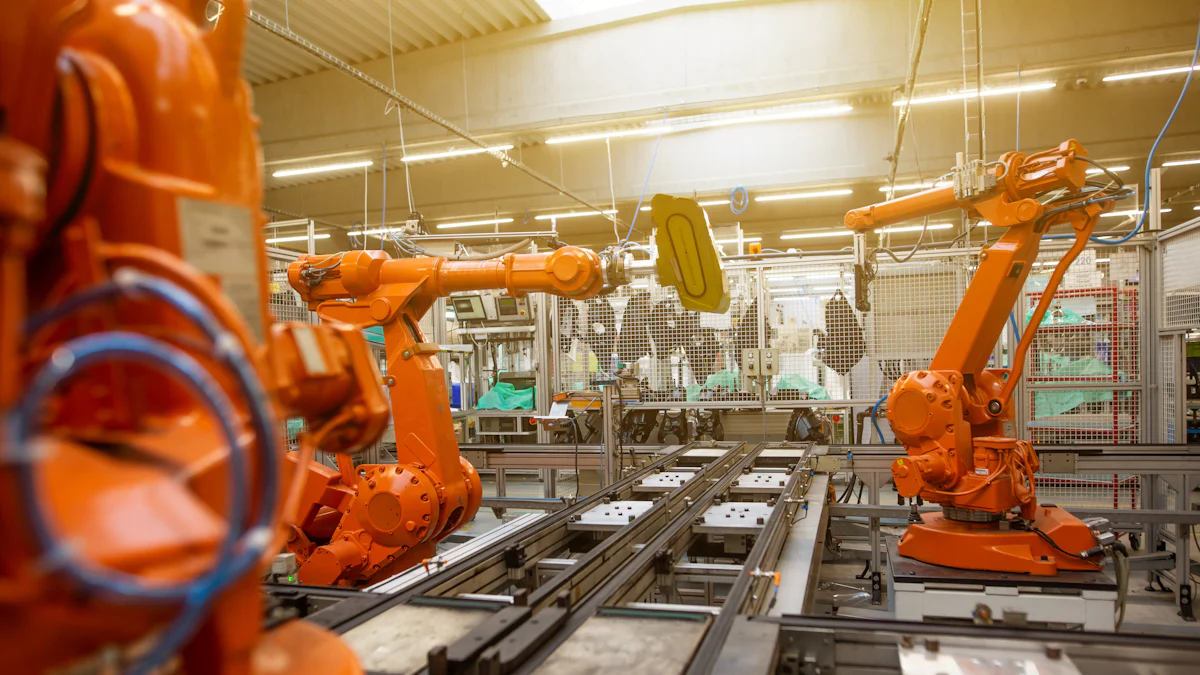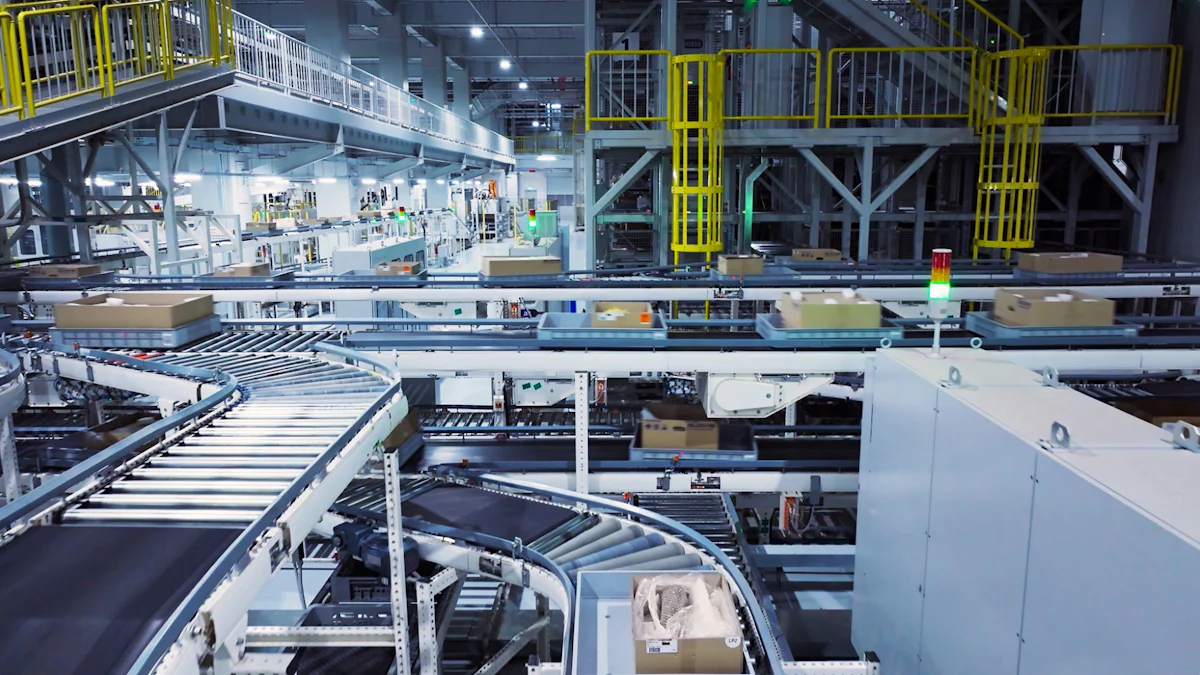Exploring the Productivity Gains from Smart Manufacturing

Smart manufacturing represents a transformative approach in modern industry. This method integrates advanced technologies to optimize production processes. The importance of smart manufacturing has grown due to its ability to enhance efficiency and reduce costs. Companies adopting these technologies report significant productivity gains. For instance, a 25% boost in productivity and a 35% reduction in downtime highlight the potential benefits. These improvements contribute to a more agile and responsive manufacturing environment.
Key Technologies in Smart Manufacturing

Industrial Internet of Things (IIoT)
Role of IIoT in Enhancing Connectivity
The Industrial Internet of Things (IIoT) plays a crucial role in smart manufacturing by enhancing connectivity. IIoT connects machines, devices, and systems within a manufacturing environment. This connectivity allows seamless communication between different components. The integration of IIoT enables manufacturers to monitor operations in real-time. This monitoring leads to increased efficiency and reduced downtime.
Impact on Data Collection and Analysis
IIoT significantly impacts data collection and analysis in smart manufacturing. Sensors and devices collect vast amounts of data from production lines. This data provides valuable insights into operational performance. Manufacturers use these insights to optimize processes and improve productivity. The automotive, textile, and pharmaceutical industries benefit from IIoT through improved precision and quality control. The ability to analyze data in real-time enhances decision-making capabilities.
Manufacturing Execution Systems (MES)
Integration with Production Processes
Manufacturing Execution Systems (MES) integrate seamlessly with production processes. MES acts as a bridge between enterprise resource planning (ERP) systems and the shop floor. This integration ensures that production aligns with business objectives. MES automates data collection and digitizes records. This automation leads to repeatability and control over manufacturing processes. The integration of MES supports informed decision-making in smart manufacturing.
Real-Time Monitoring and Control
MES provides real-time monitoring and control in smart manufacturing environments. This capability allows manufacturers to track production activities as they happen. Real-time monitoring helps identify issues promptly. Manufacturers can address these issues before they escalate. The evolution of MES addresses real-time data challenges. MES becomes integral to the transformation of smart manufacturing. The combination of MES with other technologies delivers powerful benefits.
Real-World Applications and Case Studies

JUSDA's Innovations in Smart Manufacturing
Overview of JUSDA's Approach
JUSDA Supply Chain Management International Co., Ltd. stands at the forefront of smart manufacturing. The company integrates advanced technologies to enhance supply chain efficiency. JUSDA employs big data, IoT, and cloud platforms to optimize operations. These technologies support complex customer demands and improve resource utilization. JUSDA's JusLink platform offers real-time collaborative capabilities. This platform connects suppliers, manufacturers, service providers, and customers. The integration ensures seamless communication and decision-making.
Specific Productivity Improvements Achieved
JUSDA has achieved significant productivity improvements through smart manufacturing. The implementation of IIoT and MES technologies has enhanced operational efficiency. JUSDA reports a 25% increase in productivity and a 35% reduction in downtime. The JusAI Intelligent Dialogue Engine revolutionizes logistics operations. This engine provides accurate and rapid services to customers. The AI Dynamic ETA Intelligent Algorithm improves supply chain efficiency. This algorithm predicts arrival times more accurately, reducing operational costs. JUSDA's innovations exemplify the transformative power of smart manufacturing.

SMART JusLink
Supply Chain Management Solution
Other Industry Examples
Case Study of a Leading Manufacturer
A leading automotive manufacturer has embraced smart manufacturing. The company implemented IIoT and MES systems to optimize production. These technologies enabled real-time monitoring and data analysis. The manufacturer experienced a 12% increase in labor productivity. The integration of smart technologies improved quality control and precision. The company's agility and flexibility in production increased significantly. The adoption of smart manufacturing transformed the company's operations.
Lessons Learned and Best Practices
Several lessons emerge from these industry examples. Smart manufacturing enhances connectivity and data-driven decision-making. Companies should prioritize the integration of IIoT and MES technologies. Real-time monitoring and control are crucial for operational efficiency. Employee engagement improves with the use of smart technologies. Training programs should focus on enhancing skills and job satisfaction. Companies must adapt to market changes with agility and flexibility. The adoption of smart manufacturing leads to significant productivity gains.
Broader Impacts on Manufacturing Processes
Agility and Flexibility
Smart manufacturing enhances agility and flexibility in production processes. Manufacturers can quickly adapt to market changes. The integration of advanced technologies allows for rapid adjustments. This adaptability reduces manufacturing lead times by up to 50%. Companies can respond swiftly to shifts in demand or supply. Smart manufacturing supports customization and personalization. Products can be tailored to meet specific customer needs. This capability leads to increased customer satisfaction and loyalty.
Employee Engagement
Technology plays a significant role in enhancing employee skills. Smart manufacturing provides opportunities for skill development. Employees engage with advanced tools and systems. This engagement fosters a culture of continuous learning. Workers gain proficiency in using cutting-edge technologies. Smart manufacturing impacts job satisfaction positively. Employees experience a sense of accomplishment and purpose. Productivity increases as a result of higher job satisfaction. The work environment becomes more dynamic and motivating.
Smart manufacturing transforms industries by improving production efficiency and reducing downtime. Companies using smart technologies report enhanced product quality and customization capabilities. Data-driven decisions lead to better outcomes. The future of smart manufacturing holds immense potential. IoT connectivity, AI algorithms, and data analytics will enhance operational efficiency. Automation will increase intelligence in factories. Industry adoption is crucial for staying competitive. Embracing smart manufacturing optimizes the entire value chain. Real-time data and insights drive innovation. Businesses should invest in these technologies for long-term success.
See Also
Exploring Lean Supply Chain Strategies for High-Tech Manufacturing Success
Revealing the Secrets: High-Tech Manufacturing Consulting Demystified
Maximizing Productivity: AI Solutions for Supply Chain Optimization
Embracing Automation: High-Tech Manufacturing Warehouse Advantages
Harnessing the Potential: Robotics in Logistics for Improved Warehouse Efficiency
